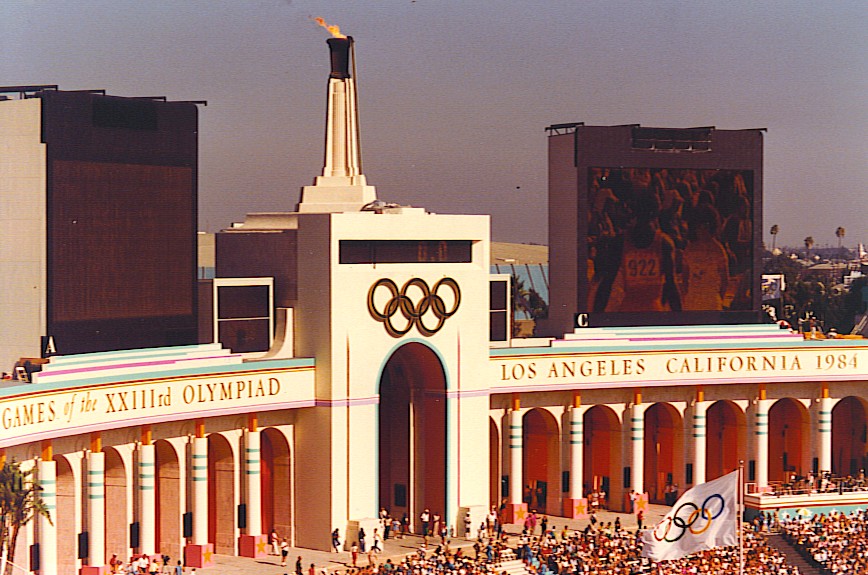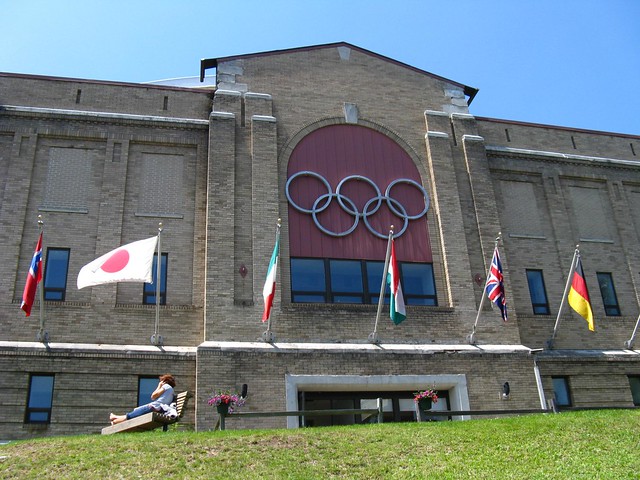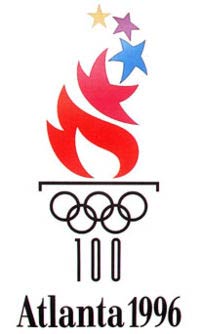
From the St. Louis Post-Dispatch, "Guest commentary: Get used to Olympics not being on U.S. soil," by Rick Burton, on 15 August 2012 -- Now that the London Summer Olympics are finally over, some Americans might wonder when the United States will next host the games.

The last time was during the scandal-plagued Salt Lake City games in 2002. That completed a 22-year run when the United States was the host in Lake Placid, N.Y. (1980), Los Angeles (1984) and Atlanta (1996) or, on average, every 5 1/2 years. Yet as of now, the U.S. won't host the Summer Olympics before 2024 or perhaps even long after that.
A harsh prediction? Not really because when New York City lost the 2012 bid to London, and Chicago failed for 2016, the U.S. Olympic Committee chose not to bid for 2020. That means 2024 is the earliest the Summer Olympics might return to American soil. And if the U.S. were to bid and win the Winter Games in 2022 that would make it even less likely the U.S. will get the Summer Games any time soon.

Summer Olympics in Los Angeles, 1984
The main issue is that many International Olympic Committee members don't like the U.S. law (the Ted Stevens Olympic and Amateur Sports Act of 1998) that gives domestic-licensing ownership of the word "Olympics" and famed five interlocking Olympic rings to the federally chartered USOC. That means broadcast and sponsorship rights for any U.S. telecast or advertisement must be approved by the USOC.
And that adds up to a great deal of money based on a deal carved out in the mid-1980s that gives the USOC 12.75 percent of the billions of dollars NBC pays to the IOC for U.S. broadcast rights and 20 percent from the billions more the IOC receives from worldwide exclusive sponsorship deals (known as The Olympic Program, or TOP) with companies such as Coca-Cola, McDonald's and Visa.

Winter Olympics in Lake Placid, NY 1980
To make matters worse for many IOC members, the U.S., after getting more money from the organizing body than any country in the world, then goes on to win the most medals at the Atlanta, Sydney, Athens, Beijing and London games. This dominance is a sore point for the IOC's members, who seem to have decided that a new revenue-sharing deal was needed before the U.S. would again win the rights to host the games.
For years, the USOC's administration stonewalled discussions with the IOC about changing a broadcast marketing agreement that was designed to run in perpetuity. But as the bidding losses mounted, the USOC's new leadership, led by Chairman Larry Probst and Chief Executive Officer and Secretary General Scott Blackmun, offered to change the deal.
There are at least two possible ways to look at the revision of the revenue-sharing deal reached between the IOC and USOC in Quebec City, Canada, in late May.
The first is that the IOC's 100-plus members held the USOC hostage, threatening to withhold awarding the games to the U.S. again until the contract was altered.
The second more palatable interpretation is that the USOC magnanimously opted to give money back to the Olympic movement to ensure more equitable athletic competition in future games. This assumes, probably falsely, that the USOC decided that revenue received from the IOC gave the U.S. team an unfair advantage when it came to winning medals. To wit, the IOC was paying the USOC hundreds of millions of dollars that were used to train American athletes to dominate world sport.

Winter Olympics in Salt Lake City, Utah 2002
For many countries, it is irrelevant that the U.S. is the only major country that doesn't employ a minister of sport or that U.S. athletes receive no federal-government funding. Because the IOC controls global Olympic sponsorship and grants television broadcast rights on a country-by-country basis — NBC contributes as much as half of the IOC's total TV revenue — the IOC acts as the world's ultimate sports banker.
In short, the committee determines where the Olympics are held and how they will be funded. It then goes and collects vast sums from networks and sponsors before redistributing the available proceeds to the national Olympic committees of the world.

But for the IOC to broadcast the Games in the U.S. or for TOP sponsors or even domestic USOC sponsors to activate their partnerships, the USOC must get paid its predetermined percentage. That's the law.
So what does this new deal, which starts in 2020 and runs for 20 years, mean? In short, the IOC will pay out much less money to the USOC (only 7 percent on new TV deals and 10 percent of sponsorships) and, for its part, the USOC will agree to contribute $15 million to $20 million every four years for administrative costs to stage all future Olympic Games.

So far, it sounds pretty one-sided. But here's the kicker: The USOC probably has a much better chance of winning the right to host the Summer Games 12 years from now.
Let's be honest, though. If future U.S. teams continue dominating the medals stand and numerous IOC members won't budge in their anti-Americanism, then the USOC may have sacrificed guaranteed revenue while failing to appease the IOC. In that case, no one will have a clue when the U.S. will ever again play host to the Summer Games.

Rick Burton is the David B. Falk professor of sport management at Syracuse University and was chief marketing officer of the U.S. Olympic Committee for the 2008 Beijing Summer Olympics. (source: St. Louis Post-Dispatch)

No comments:
Post a Comment